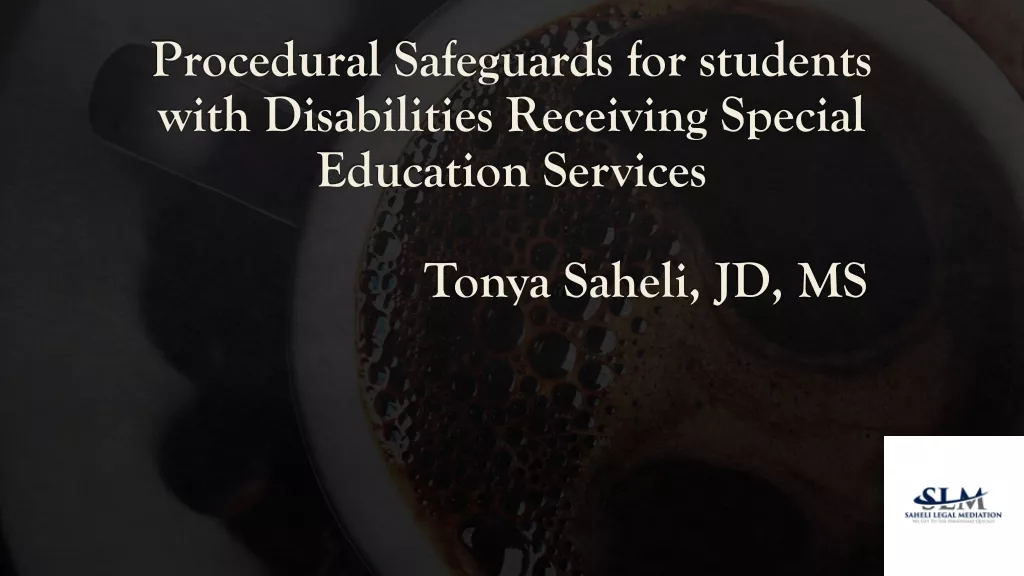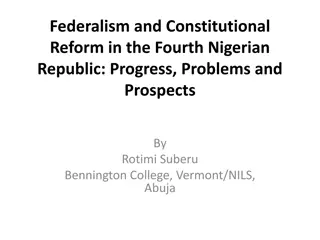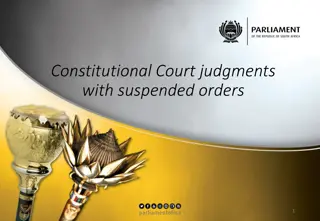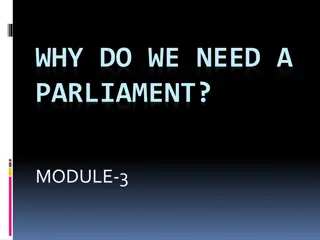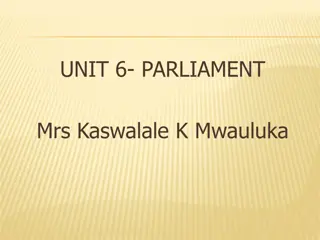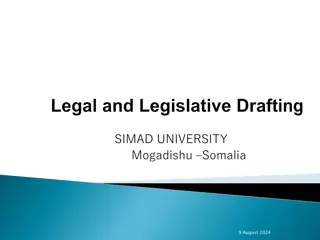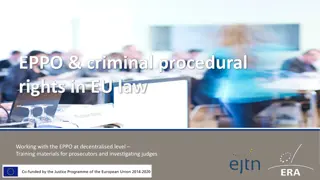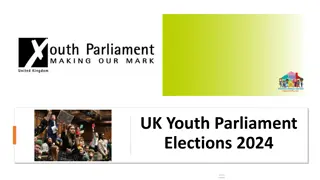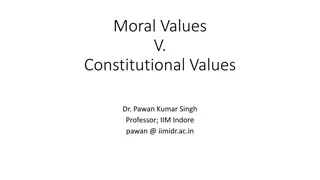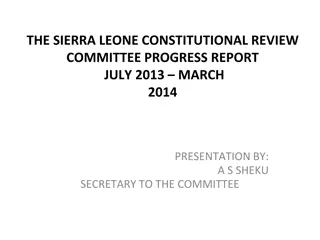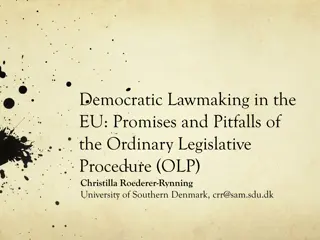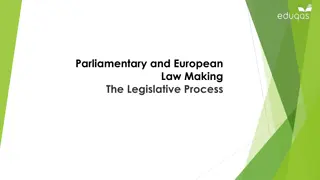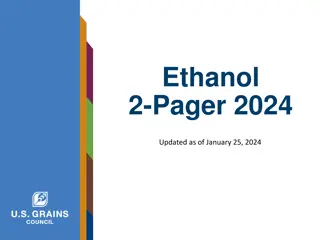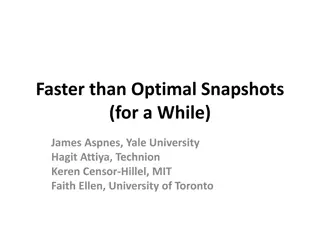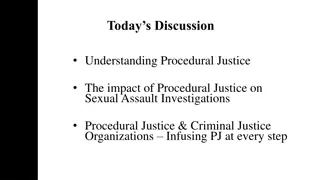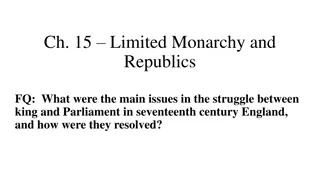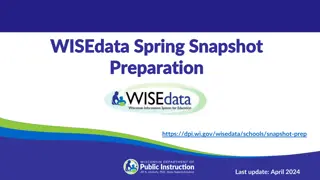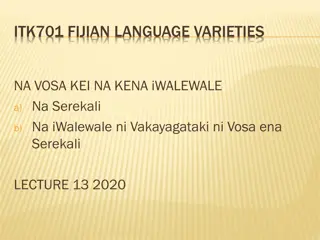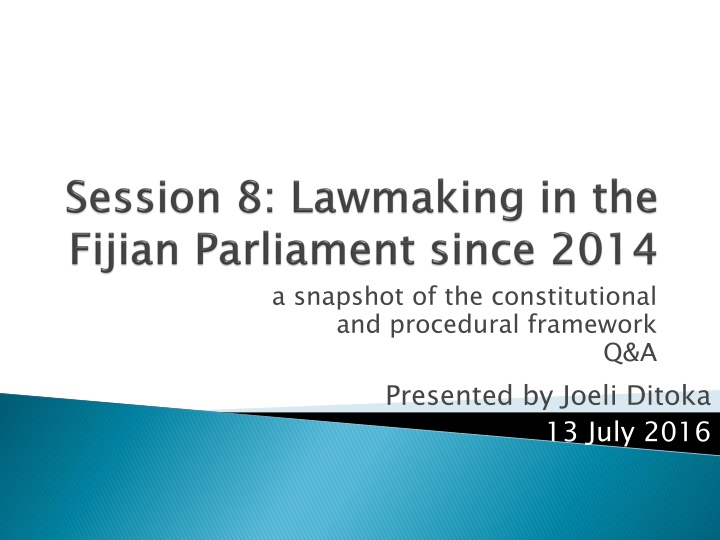
Constitutional and Procedural Framework Q&A - Legislative Powers and Committees Overview
Explore the constitutional and procedural framework for legislative functions, committee powers, public participation rules, legislative scrutiny procedures, and post-report processes as presented by Joeli Ditoka. Understand the exercise of legislative powers, Bill introduction guidelines, committee establishment rules, and more for effective governance.
Download Presentation

Please find below an Image/Link to download the presentation.
The content on the website is provided AS IS for your information and personal use only. It may not be sold, licensed, or shared on other websites without obtaining consent from the author. If you encounter any issues during the download, it is possible that the publisher has removed the file from their server.
You are allowed to download the files provided on this website for personal or commercial use, subject to the condition that they are used lawfully. All files are the property of their respective owners.
The content on the website is provided AS IS for your information and personal use only. It may not be sold, licensed, or shared on other websites without obtaining consent from the author.
E N D
Presentation Transcript
a snapshot of the constitutional and procedural framework Q&A Presented by Joeli Ditoka 13 July 2016
Constitutional and procedural framework and the referral process; Legislative functions of committees; Powers of committees Rules about public participation; Procedures during legislative scrutiny; and What happens once a Committee Reports back. (Presentation does not deal with SO51).
Exercise of legislative powers 47. (1) Any member of Parliament may introduce a Bill in Parliament, but only the Minister responsible for finance, or another Minister authorised by Cabinet, may introduce a Money Bill, as described in subsection (4). (2) Parliament may proceed to consider any Bill in accordance with its standing orders, which must provide (a) a structured process for the introduction, deliberation, amendment and enactment of Bills; and (b) sufficient time to elapse between the steps in the process for members and committees to give due consideration to each Bill. (3) A Bill may proceed more quickly than permitted by the standing orders if (a) when the Bill was introduced, the mover requested that Parliament approve consideration of (b) a majority of the members of Parliament voted in support of that request. (4) In this section, a Money Bill is any Bill that (a) imposes, increases, alters, remits, grants exemptions from, reduces or abolishes taxes; (b) imposes charges on a public fund or varies or repeals any of those charges; (c) appropriates public money or otherwise relates to public moneys; (d) raises or guarantees any loan, or its repayment; (e) deals with the receipt, custody, investment, issue or audit of money; or (f) deals with anything incidental to those matters. the Bill without delay; and
Committees 70. Parliament must, under its rules and orders, establish committees with the functions of scrutinising Government administration and examining Bills and subordinate legislation and such other functions as are specified from time to time in the rules and orders of Parliament. Standing orders 71. (1) Parliament may make standing orders and rules for the order and conduct of business and proceedings in Parliament and its committees and for the way in which its powers, privileges and immunities may be exercised and upheld.
83 Who may introduce Bill (1) A Minister may introduce a Bill but only the Minister responsible for Finance, or another Minister authorised by Cabinet, may introduce a Money Bill. (2) A member may only introduce a Private Bill provided that Standing Order 94 is complied with by the member. (3) No less than two days before the sitting day at which the Bill is intended to be read, the Minister or a member as the case may be must (a) give notice to the Secretary-General of his or her intention (b) publish a notice of the Bill together with a copy of the Bill in (4) Clause (3) does not apply if the Bill is a Money Bill. (5) A Bill is introduced by being read a first time under Standing Order 84. to introduce a Bill; and the Gazette.
94 Private Bill (1) Before a Private Bill is introduced, the member intending to introduce the Bill must (a) give notice of his or her intention to introduce the Bill (b) publish the Bill in three successive editions of the Gazette. (2) When giving notice to the Secretary-General of the member s intention to introduce the Bill, the member must also provide to the Secretary-General by publishing, in the Gazette, the general nature and objectives of the Bill; and (a) a letter endorsing the Bill s introduction from the person or persons that will be affected by, or benefit from, the Bill; and (b) evidence that the member has satisfied the requirements of clause (1).
84 First reading (1) Where a motion is moved That [name of Bill] be now read a first time , it shall be passed without debate and without the question being put. The Secretary-General shall then read the title of the Bill and the Bill is then set down for second reading on a future sitting day. (2) At the time of moving First reading of a Bill, the member must table four copies of the Bill in Parliament. (3) Copies of the Bill shall be made available to each member as soon as is practicable. 85 Second reading (1) On a motion being moved and seconded That [name of Bill] be now read a second time , a debate may take place on the principles and merits of the Bill. (2) To the question That [name of Bill] be read a second time , an amendment may be moved and seconded to leave out all the words after the word that and the words the second reading of [name of Bill] be deferred until [date] be inserted. If the amendment is seconded, the question That the amendment be made must be proposed and a debate may take place on the amendment until the question is put. (3) The amendment described in clause (2) is the only amendment permitted to be moved at a second reading. (4) If the question that the Bill be read a second time is carried, the Secretary-General then reads the title of the Bill and the Speaker refers the Bill to (a) the standing committee with jurisdiction over the subject-matter of the Bill; or (b) if Parliament resolves, a special committee (whether existing or established for the purpose of considering the Bill).
Policy / Idea Consultation Draft the law Consultation 2nd Reading [Debate on principle of Bill only. Vote] 1st Reading [No vote & no debate] Gazette Cabinet approval 1 2 1 Standing Committee [Public Input. Clause by Clause. Vote] Committee of whole House [Clause by clause. Vote] 3rd Reading [Debate. Vote] President s Assent 30 7
Set out in SO 110 and subject to mandates in SO 109: (a) examine each Bill referred to the committee by Parliament, and make amendments to the Bills, to the extent agreed by the committee; and (b) examine any subordinate legislation tabled in Parliament within its category of affairs.
112 Powers of standing committees (1) For the purposes of performing its functions and subject to section 74 of the Constitution and any other written law governing Parliament, a standing committee has the power to (a) summon any person to appear before it to give evidence or provide information; (b) compel the production of documents or other materials or information as required for its proceedings and deliberations; (c) determine if it will accept oral or written evidence; (d) determine the extent, nature and form of its proceedings; (e) conduct its proceedings or any aspect of its work at any venue it deems to be most suitable, including, where Parliament is not sitting, a venue beyond the precincts of Parliament; (f) appoint sub-committees in accordance with Standing Order 122; (g) consult and liaise with any government department falling within its category of affairs; (h) in accordance with section 91(3) of the Constitution, compel the attendance of a minister to testify or to produce documents or other materials; and (i) exercise such other powers as may be prescribed or assigned to it by the Constitution, any law, these Standing Orders or a resolution of Parliament. (2) For the purposes of clause (1)(a) and (b), a standing committee has the same powers as those of the High Court.
Function of all Standing Committees Occurs after second reading, Speaker refers to the Committee with the corresponding mandate as set out in SO 109 pursuant to SO85(4)(a) or a special committee pursuant to SO85(4)(b)
Petitions, public access and participation 72. (1) Parliament must (a) conduct its business in an open manner, and hold its sittings and those of its committees, in public; and (b) facilitate public participation in the legislative and other processes of Parliament and its committees. (2) Parliament and its committees may not exclude the public, including any media, from any sitting unless, in exceptional circumstances, the Speaker has ordered the exclusion of the public on grounds that are reasonable and justifiable.
111 Access to standing committee meetings (1) Standing committees must (a) ensure all meetings are open to the public and the media; (b) in order to encourage public access to committee meetings, provide (c) unless otherwise directed by Parliament, provide sufficient time, notification (2) Despite clause (1)(a) and (b) and in accordance with section 72(2) of the Constitution, a committee may, after consultation with the Speaker, conduct a meeting that is closed to the public and media where the committee is considering a matter related to (a) National security; (b) Third party confidential information; (c) Personnel or human resources; or (d) Deliberations and discussions conducted in the development and finalisation of committee recommendations and reports. notification of its meetings through the media, websites accessible to the public, advertisements and other means of promotion; and and an adequate opportunity for public representations and input into its activities prior to finalising its report and recommendations.
SO 119(6) specifies that Committees must follow the procedure set out in SO 87 with necessary adjustments; Clause by clause scrutiny; Strive for consensus and where not possible vote and record results SO 118(b)(i)(ii); and Gender mainstreaming SO 110(2).
No later than 30 days after referral pursuant to SO 121(1)(a); May table interim reports pursuant to SO 121(2); No minority report - SO 121(3); Tabled by Chair or delegate SO 121(4)(a); Minutes must be annexed SO 119(2); and Copy of amended Bill (if any amendments made) to be annexed.
Pursuant to either SO 121 or 129(5); Bill set down for consideration by Committee of the Whole Parliament (CoW) on a future sitting day pursuant to SO 86. Procedure for CoW set out in SO87 clause by clause reading, provisions first before schedules. After the CoW, Third Reading moved pursuant to SO 88.

